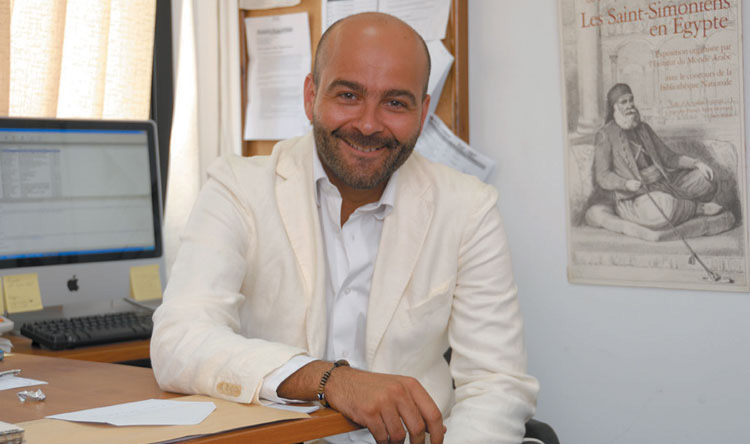s
CONTACT US |

FEATURES Meet the Arab Press ALUMNI PROFILES AKHER KALAM
|
|
Rethinking Sharia Amr Shalakany, assistant professor of law and director of AUC’s LLM program, has studied and practiced law all over the world. He earned a degree from Harvard, where he later taught Islamic and comparative law; worked for the international law firm, Baker & McKenzie in London; served as legal adviser for the Palestine Liberation Organization during the second intifada; and taught at Birzeit University, where he helped set up a law clinic. Recently, Shalakany has been selected as a Carnegie Scholar by the prestigious Carnegie Corporation of New York for his commitment to investigating new lines of research in modern Egyptian legal history. Through his research titled “The Redefinition of Sharia in Modern Egyptian Legal Thought: 1798 - Present,” Shalakany traces the changing definition of sharia –– Islamic law –– over the past two centuries of Egyptian jurisprudence and court practice. He challenges the commonly accepted idea that there was a transition from Islamic to secular law in 1883, arguing that legal secularism existed in Egypt prior to that year and was rooted in Ottoman and Islamic concepts of legitimacy. “The common conception of Islamic legal history is one of continuity, but in reality, the very definition of sharia has changed in the past 200 years,” he said. “The way we understand it now is not the way it has always been defined.” “A foundational premise has long ruled among historians of modern Egyptian law, namely that Egypt had an ‘Islamic’ legal system before 1883, which modernized into a ‘secular’ normative order from that year onward,” Shalakany said. “This premise is shared by Western and Egyptian mainstream historians alike, both of whom generally describe the post-1883 development of Egyptian legal thought as riddled with anxieties over reconciling traditional sharia principles and modern needs for legal reform. The same premise also underpins ideological demands for the return of the sharia by Islamist political actors today, most prominently in the Muslim Brotherhood platform during the 2007 elections, calling for a full-scale review of Egypt’s legal system to assess its conformity with sharia norms.” Shalakany is at the forefront of a growing trend in Islamic legal historiography to scrutinize the origins of contemporary ideas of legal authority. In the recent past, the solidity and rigidity of sharia has been largely taken for granted. “There is a new stream of historical scholarship that has been challenging the status quo of Islamic legal historiography since the 1950s,” he noted. “The popular story can now be completely debunked.” His research has attracted significant attention, particularly since the Carnegie Foundation of New York has offered him a grant as part of the Carnegie Scholars Program. The grant, established in 1999, provides financial and intellectual support to writers, analysts and thinkers addressing critical research questions. Scholars are selected for their originality, intellectual capacity and ability to communicate their ideas in ways that can catalyze public discourse. Shalakany’s research sets him apart, both because of its quality and the fact that his concern is with issues that do not often receive concentrated attention in the West. AUC’s law department, he noted, is committed to addressing these issues that have been relegated to the periphery of legal study. Such issues range from studies of Islamic law in action to discussions of how best to participate in globalization. “What we offer is the only degree of its kind in Egypt,” he said. Generally, Egyptian legal education focuses on rote memorization and what Shalakany referred to as “carbon-copy exams.” Such methods churn out students who have memorized a great deal of information, but who are unequipped to analyze, debate and practice law on the international stage. “I myself am a product of this system,” Shalakany laughed. He recalled arriving at Harvard as a law student and being surprised by the amount of debate, questioning and prolonged pondering taking place in the classroom. “I showed up for class the first day ready to take notes on a long lecture. Instead, the professor spoke for five minutes and began grilling the students. … The idea was not to leave students with a right or wrong answer, but to teach them how to think.” Now, Shalakany and the other scholars in AUC’s law department are demanding the same of their students. “I ask my students to come to class prepared to be asked about anything regarding the readings,” he said, adding that AUC’s law students are poised to serve in leading positions in a country that sorely needs strong legal minds. “We have many students going on to work in courts, multinationals, ministries and NGOs. Some students have also taken roles in public advocacy and public interest,” he said. |